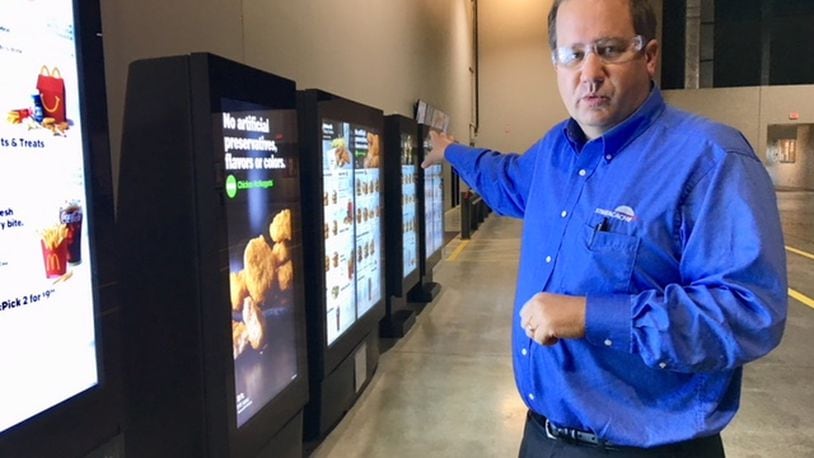The company’s 380,000-square-foot Trotwood operation has become an important part of the business, Chris Riegel, Stratacache founder and chief executive, said in a recent interview at the facility.
Riegel has a map on the wall of his office, with a circle over part of Southeast Asia. More people live inside that circle than outside, he said.
“The market sector that we serve globally — brands, banks, car companies — spends about $1.2 trillion a year on trying to convince a customer what to wear, what to buy, what to drive, where to vacation,” Riegel said.
He adds: “I can have a pretty good business by carving out a couple of percentage points of that.”
FIVE FAST READS
• Southwest adding two nonstop flights to warmer climates from Cincinnati
• Kings Island owner hits record revenues
• Walmart to test new delivery method
•Temperature abuse caused Chipotle outbreak: 3 things to know about it
• Former Homearama luxury home listed for nearly $1M
Much of the company’s heavy expansion is in China and India, meaning Stratacache is active in an area that that has some two-thirds of the global population. A “tier-two” city in China has eight million people, Riegel noted.
“The economic opportunity there is amazing,” he said.
Closer to home, the CEO makes no bones of the fact that he is proud of what Stratacache has done in Trotwood, taking an empty brownfield plant and transforming it with no taxpayer money. The company sought no Montgomery County ED/GE (Economic Development/Government Equity) grants to invest in the site.
When Stratacache bought the building in the summer of 2016, the grass outside was four feet tall. To date, the company has invested some $30 million there.
“Not a dime of public money,” Riegel said.
Syncreon, which formerly operated the facility, had about 400 to 500 employees at one point. Riegel said that while Stratacache’s workforce is smaller, it is growing all the time.
“The goal is that as we continue to evolve outdoor display systems, there will be more and more investment in this facility, as a kind of center of excellence for that,” he said.
Stratacache is vertically integrated, meaning it designs, builds and assembles what it sells, to customers in banking, food service and many other areas. Walk on the Trotwood manufacturing floor, and you’ll see employees bring together complex products on a smoothly moving assembly line not unlike an auto assembly line.
One station on the line douses displays in gallons of water, simulating hurricanes and testing how water-tight the products are.
»RELATED: Dayton airport lags behind during busy travel season
The Trotwood site averages about 90 employees — drawing a $5 million annual payroll — with seasonal retail peaks at about 110 to 120 employees. Globally, the company has about 750 employees, with about 320 of those in the Dayton area.
“I would wager we will be at about 1,000 (employees) in the first quarter of next year,” Riegel said.
Stratacache continually adds new products and designs, which also pushes hiring forward.
The Dayton area remains a good base for Stratacache, the CEO said. The talent is here, as are relatively low operating costs.
Riegel recalled that Teradata recently announced that it is closing its Miami Twp. operation to move to San Diego.
RELATED: Elder-Beerman hints at comeback following bankruptcy
“We have 100 employees in California today, plus or minus,” Riegel said. “It is ungodly expensive. The regulation, the government interference.”
And he rejects the growing tech trend of trading salaried employees for outsourced workers.
“Then you lose the tribal DNA,” Riegel said. “No one has the experience, because you’ve outsourced it to Mumbai or Bangalore or another (city). You can’t lose that knowledge base.”
About the Author
